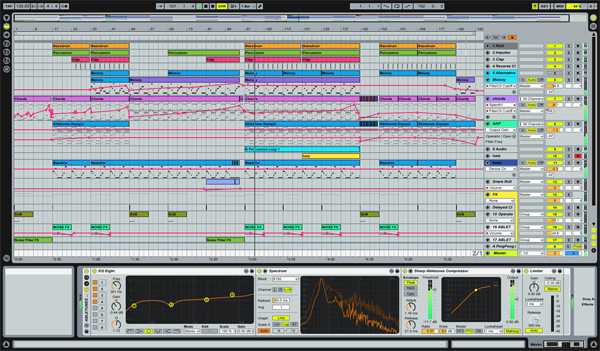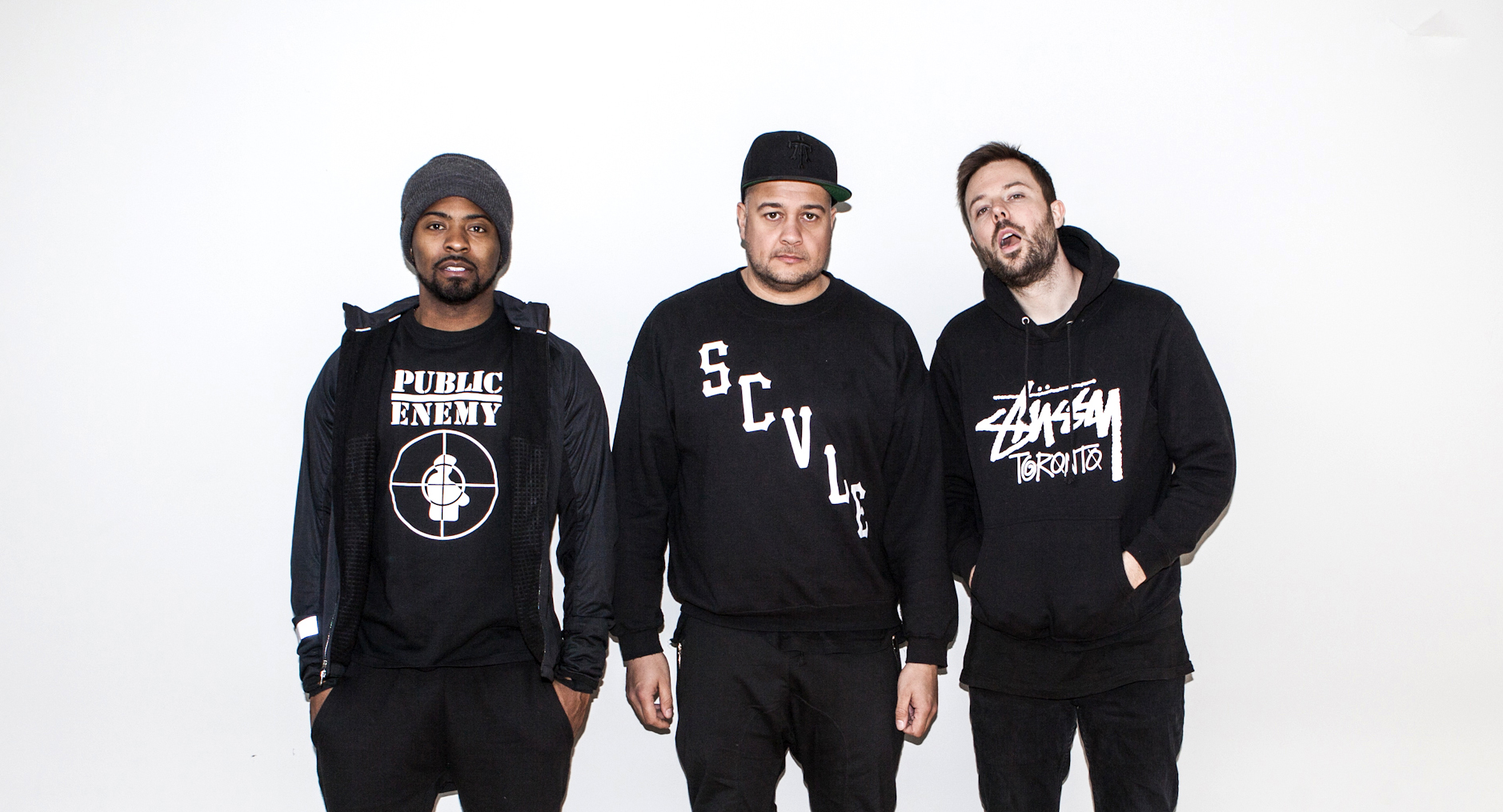Toronto-based live electronic act Keys ‘N Krates have been on the road for the past several months, with a tour across the US in support of their new EP, released on Dim Mak Records. The trio, comprised of DJ Greg Dawson aka J Flo, keyboardist David Matisse and drummer Adam Tune is know for hard-hitting sounds layered with pitch-shifted vocal samples and melodies; reaching to elements of Trap, Bass music and hip hop for inspiration. We spoke to the guys to learn more about their approach to production, live performance, collaboration, and more.
Nate Mars: Can you tell us a bit about the new EP, “Every Night“?
Matisse: We wanted to make a little body of work, like a little bit of a mini album as opposed to just a collection of songs that don’t necessarily have anything in common but are good songs. We came up with the Every Night concept, which is basically around making tunes that you could hear at various points in a night. It’s different from our Solow EP, where we were really experimenting with Bass music, Rap beats and Trap.
We wanted to on this EP go further into making more emotional chord progressions using more unique sounds, using even cooler samples, even more interesting drums and stuff like that. We really just tried to separate ourselves a bit from the herd of what’s out there and what’s going on in our genre.
NM: In terms of the collaboration process, what is that like for you? Do you work on music while on tour?
Matisse: We pretty much meet up every day. We all come into our rehearsal room with different ideas and different things that we want to do with each particular song, or the show itself, just bringing it into the group and seeing what sticks. We know something works when we’ve all jammed on it for a bit or worked on it for a bit and all of us like it. There is this policy that all three of us have to really be excited about something for it to stick around, and that seems to be working for us.
Flo might come in with some samples he’s found or Tune starts with a beat he’s made or I come in with some melodies. We all might start an idea at home and then come in and let everyone get at it and things like that or the idea can start right here. We’re constantly digging for music, and we’re constantly listening to music. We’re never really slow on ideas, we always have them, it’s more just finding the time to actually work on them.
NM: What DAW are you using the most?
Matisse: We use Ableton Live.
NM: For what you’re doing, what is it that you find draws you to Ableton Live?

Ableton Live – Arrange View
Greg: Matisse and Tune were using other DAWs before. I learned on Ableton Live, so it’s really all I know. I think anybody that’s on Ableton Live will tell you it’s really friendly with building ideas super fast. You can do sh*t really quickly and get ideas out. That appeals to all of us. Matisse used to use an MPC and chop up sounds. Everybody knows how tedious that is. There’s a drum rack feature in Ableton that pretty much having a little MPC in front of you, which is great.
Matisse: I found that session view is great for just throwing out ideas. I like to just jam out different melodies really quickly. Session view is great for me just to go through different sounds on a keyboard and play out different melodies and record them and come back to them. Ableton Simpler is awesome as well. Being able to take a sound and throw it on to the keyboard; and have it play every single note is just unbelievable. It’s become a big part of our live show, as well.
NM: In terms of VSTs and plugins, which are some of your favorites?
Matisse: A lot of our sounds are sampled from weird sources. I will say that Sylenth1 has tended to be something that’s we’ve been using. It’s been very versatile. It also doesn’t use much CPU so I’m able to use it on stage, as well.

Lennard Digital Sylenth
Greg: We started messing with Nexus for pads as well.
Matissse: Yeah. Tune messed with Nexus. I have a bit of a problem with it because of the dongle key thing, which is a pain in the ass, but Nexus sounds great. We used to mess with Native Instruments Massive back in the day but we stopped using Massive lately.
Greg: A lot of samples… If you listen to our EP, there’s definitely synths in there but there’s a lot of extras that are voices and stuff like that that we played in on a keyboard. It’s like a breathing sound that’s pitched or a voice we found somewhere that sounds interesting.
NM: Are there any collaborations in the works with other artists or crews?
Matisse: We did a collab with our bud Grandtheft on that Keep It 100 song, which was really cool. It was fun, and it turned out great. He’s our boy. He’s obviously an incredible producer so we learned a lot every time we work with him, and that’s actually not the first time we worked on a tune with him.
We’ve got a bunch of friends that we want to do stuff, and we want to look at doing that. I will say that it’s difficult for us with the collaborations. It’s not as simple because the three of us are already collaborating.
Greg: We love to get singers and things like that and add their voice. We work with vocalists more than other producers.
NM: For somebody who hadn’t ever heard your music before, what would be the first Keys ‘N Krates track you would play for them?
Matisse: I don’t know. I’d say either “Treat Me Right” or “Dum De Dum.” I think probably “Treat Me Right,” actually. I think “Treat Me Right” was the first song where we felt we hit the sound that we were going for. I would say “Treat Me Right.”
Greg: Yeah, I’d be good with either of those or I would be good with most of the stuff on the new EP, too. I’m pretty proud of.
NM: Any advice or words of wisdom to share when it comes to collaborating with other producers or finding your own sound?
Matisse: I think just trying to learn the sh*t out of everything you can. There are tons of tools online to learn how to become a producer now. Just doing it, just putting in the 10,000 hours and trying to figure out a sound that you are going for and trying to execute it, then, make it as much your own as possible and separate yourself from other people that are tackling that sound. Don’t be a di*k.
NM: [laughs] That’s good advice.
Greg: I would also say to some people, don’t be too much of a perfectionist early on. I think there are a lot of producers that hear the guys that have been doing it for years and they expect their first beat to sound perfect, and when it doesn’t they get really down. They think that the first think they make is going to sound where it’s supposed to, and that’s not the way it works. You have to make a lot of sh*t and accept that it’s a process. Those first beats you make aren’t going to sound exactly the way you want in your head, but each one of those beats is going to get you another step to the beat that does sound the way you want it to.
About the Splice Artist Series:
We empower music creators to create and collaborate fearlessly. Our goal is to build the best platform possible in order to enable that process. We hope that you learn just as much as we do, hearing from artists about their workflow and how they collaborate. Most importantly after reading, we hope you are inspired to make music!
October 21, 2014



